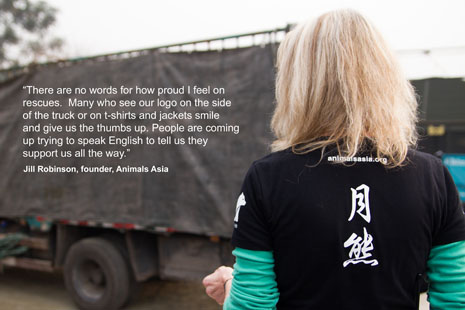Jill Robinson: Inside a China bear rescue
25 April 2014
As Animals Asia embarks on the world’s biggest ever bear rescue transporting 28 sick bears 1,200km from Guangxi to Sichuan, Animals Asia founder and CEO, Jill Robinson reflects on what it’s like on the inside of an emergency bear rescue.
From sleeping on the bus for days to conducting emergency surgery by the roadside, struggling to find vegetarian and vegan food in the country’s more isolated regions or battling against non-stop CDs of Chinese pop ballads, Jill has done it all for the bears.
Previously the largest number of bears Animals Asia transferred was in 2010 when 10 bears were taken from Shandong to Chengdu. The jump to 28 bears is a remarkable one but Jill remains unfazed:
“I’m not worried about technical issues or the numbers involved because I know we’ve got it covered. I know no other team that kicks in like ours on emergency rescue. We’re a very well-oiled machine, with protocols for protocols - be it controlling crowds or performing emergency surgery.”
Helping that team every step of the way is the growing support a rescue encounters on the journey.
“There are no words for how proud I feel on rescues. Many who see our logo on the side of the truck or on t-shirts and jackets smile and give us the thumbs up. People are coming up trying to speak English to tell us they support us all the way.”
But ultimately, the bears’ welfare comes first and intense scrutiny can cause problems. It’s important that staff keep curious crowds away from the bear cages, for their own safety and the bears’ well being.
“People are so keen to see the bears and word spreads like wildfire. Even stopping for petrol and to check on the bears is enough time for a crowd to form, and controlling them is vital to maintaining our responsibility to the bears and the public.”
“The stress on bears is what troubles me most during rescues. It can’t be pleasant, in a cage on the terrain we’re travelling on. We know they will be ok – but we can’t explain that to the bears. Doubtless they are recalling past bad experiences, becoming defensive, aggressive, confused, agitated, frightened. We can’t explain to them, but we do everything we can to make life better by piling on the tender loving care and plenty of treats.”
The trip from Nanning to Chengdu is expected to take around 24 hours of near constant driving, less than some previous rescues. However, Jill isn’t taking anything for granted:
“We hope for an uneventful ride, but are ready for anything. We may have to perform drastic intervention on the way and must be prepared. However shattered you are you’ve got to have all your senses with you.”
Being prepared means having plenty of basic essentials like fresh water, wet wipes, a toothbrush and a stash of snacks, but also having ample supplies of the equipment, medicine, food and enrichment necessary to keep the bears safe and comfortable.
While sleep is typically few and far between on a bear rescue, Jill will be insisting that everyone is able to get at least a few hours because the job isn’t over on arrival. The bears will have to be unloaded, meetings held with vets and bear managers and information shared with admin and comms. Then there could also be officials to meet or media to brief.
But whether third parties are there on arrival or not, Jill can be sure that the Chengdu team will be on hand.
“I have to pay tribute to everyone on site at Chengdu – admin, cooks, cleaners, everyone. When we get back, whatever time, there will be piles of food waiting for us and many of the staff will come out to greet the bears. It’s the best possible morale boost for a tired team.”
BACK





 Healing the hidden wounds
Healing the hidden wounds
 Early summer awakening at the China Bear Rescue Centre
Early summer awakening at the China Bear Rescue Centre
 5 reasons the dog meat trade must end
5 reasons the dog meat trade must end